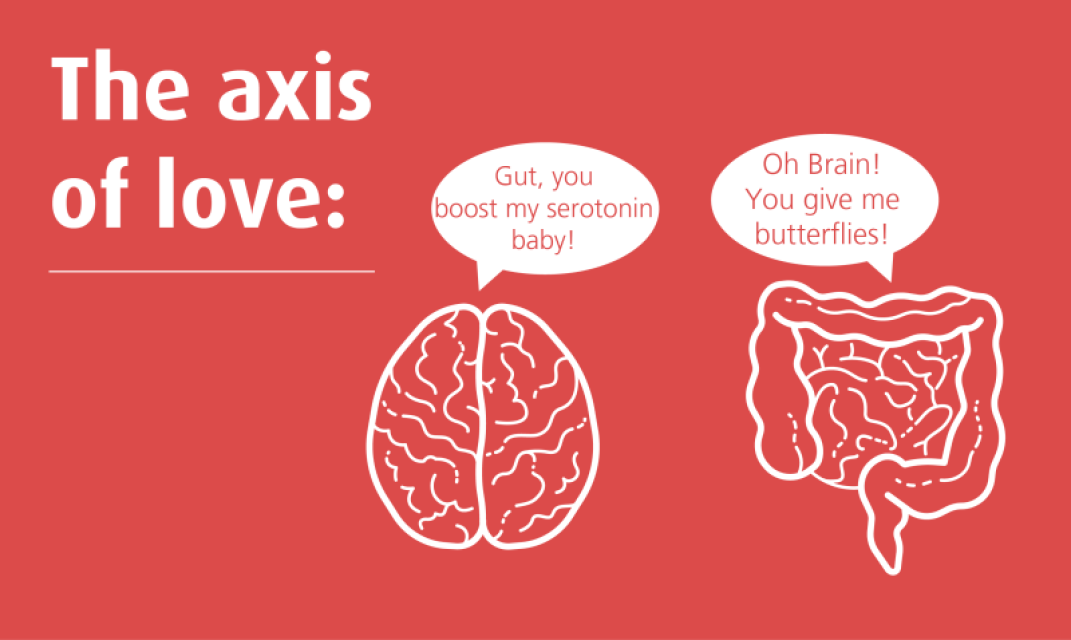Reading time: 10 min
The belly, our second brain. There is so much research on this subject today that we can’t possibly cover it all in this article. However, we’d like to talk to you about this second brain and the sometimes underestimated impact it can have on our lives. So we’re going to tell you all about the role of your belly in the three subjects that are closest to our hearts: emotions, cognitive abilities and pathologies. Through the experiments and studies we’ll tell you about, we’ll show you why today’s researchers are convinced that the belly communicates with and directly influences your brain, particularly through one element: food.
Belly and brain: a very talkative couple
Your belly is home to between 200 and 600 million neurons – as many as a dog or cat’s brain – distributed along the digestive tract. It’s also home to 100,000 billion bacteria, making it the densest ecosystem on the planet. Finally, your belly is home to ⅔ of your body’s immune cells. As for your brain, it’s 86 billion neurons that make up your gray matter and consume 20% of your energy.
Your belly, that “brain down there”, is a sensitive organ endowed with great power. The very act of digestion is highly complex and difficult to reproduce in the laboratory. Some researchers are even wondering whether the original brain might not be the intestine. For Michel Neunlist, a world expert on the enteric nervous system (neurons lining the digestive tract), the gut could be the first brain, since primitive organisms were initially composed solely of a digestive tract. The belly would have been the central brain for millions of years until the domestication of fire, when the upper brain would have developed and taken up more space to better nourish us and search for food. Cooking facilitates digestion and requires less energy to chew. The first brain then expended less energy, which meant more energy to develop the encephalon.
So your two brains are intimately connected. But technically, how do they communicate?
- Your two nervous systems are connected by a nerve pathway through the largest nerve in your body: the vagus nerve. And they talk without s-t-o-p-p-i-n-g. The vagus nerve runs from behind your ears, down through the body, innervating the lungs, heart, liver, stomach, spleen and finally the intestines. Through it, the brain controls the functioning of these organs, which in turn use it to send messages to the brain informing it of their mechanical or chemical state. The 500 million neurons in the belly are connected to the brain by the vagus nerve. The vagus nerve is therefore the key communication pathway between stomach and brain. Only 20% of the nerves connecting the brain and the belly transmit information from the brain to the belly. And 80% of these nerves transmit information from our belly to our brain.
- The gut and brain also communicate via the bloodstream. The intestinal microbiota, the bacteria in our intestines, communicates with our brain by passing food inputs through the bloodstream to the brain.
With all this communication, we now understand why diet is crucial in this tummy-brain dynamic. What your belly experiences and receives, your brain will be affected by. We’re now going to take a look at some of the research and experiments carried out around the world to illustrate this increasingly studied communication phenomenon.
Butterflies in the stomach
In Cork, Ireland, John Cryan is among those who have revealed the potential impact of the microbiota on emotions and mood. By removing gut bacteria from anxious mice and integrating them into the microbiota of normal mice, Cryan observed that their anxiety levels increased almost instantaneously. Conversely, by integrating part of the microbiota of healthy mice into the anxious mice, the latter’s anxiety decreased. Specific bacteria present in the gut therefore appear to create psychic anxiety.
At the Center for Stress Neurobiology in Los Angeles, Kristen Tillish has adapted this research on stress and the microbiota to humans, by studying the effects of taking probiotics on the stress response (a probiotic is a set of living, health-promoting bacteria). Tillish gathered together a group of 36 perfectly healthy women who declared that they felt no stress on a daily basis and had no gastric problems. For two weeks, half of these women ate probiotic yoghurts every day, while the other half ate yoghurts without probiotics. They then looked to see if their brains reacted differently to stress by showing them a series of negative and potentially threatening images. In the women who ate probiotic yoghurt every day, the researchers observed a decrease in activity in the part of the cerebral cortex called the insula, but also in the somatosensory cortex. The insula is responsible for processing sensory information internal to the body, while the somatosensory cortex is responsible for processing sensory information external to the body. What’s more, in response to the task, these women experienced reduced engagement of a vast network in the brain that includes areas related to emotion, cognition and the senses. All this means that women who consumed probiotics were less sensitive to negative or even violent images, and felt less fear or anxiety. This could be due to the production, via the activity of the microbiota, of the neurotransmitter GABA which, thanks to the neurons present in the womb, travels up to the brain and from there helps to control feelings of fear and anxiety.
Junk food: a scourge for your cognitive abilities
Numerous studies have recently focused on the impact of intestinal microbiota on cognitive abilities, particularly memory and decision-making.
At the Institute of Psychology in Lubeck, researchers confronted participants with a dilemma. A sum of money was placed on the table in front of them, to be divided into two sums between them and their game partner. But it’s this game partner, a stranger, who decides the split, and they have to accept it or not. For example, he gives you €2 and keeps €8 for himself. If the participant accepts this unfair offer, he leaves with a little money, but less than his gambling partner. If he refuses the offer, nobody wins anything. Well, it turns out that the decision taken in the face of this dilemma depends on what the person has swallowed just before. In the experiment, participants had to eat an entire breakfast before facing the dilemma. Either the breakfast was high in protein, or it was sweet. The results were clear: the same person made completely different decisions depending on what they had eaten in the morning. If participants had just eaten a high-protein, low-sugar meal, they were more likely to accept money, and therefore more tolerant of unfair offers. Conversely, with a high-sugar breakfast, participants rejected unfair offers 2X more often. This is because proteins increase the amount of dopamine, which, among other things, ensures communication between the neurons responsible for motivation and risk-taking.
This experiment is a first, and has many implications. The impact of diet on the ability to make fair and rational decisions is still being explored by science.
It’s long been proven that junk food (too much fat, too much sugar) is fattening and bad for your health. But what we didn’t yet know is that it impacts memory, and much more quickly than you might think.
On the other side of the world, in Sydney, Australia, Margaret Morris fed rats junk food for several weeks. Using an object position recognition test, she was able to demonstrate that 4 days of junk food were enough to alter the functioning of the hippocampus, the brain region responsible for memory and involved in learning and memory consolidation.
Location of the hippocampus in the brain
This phenomenon may be clarified by the study conducted by Sophie Layé at the Bordeaux Neurocampus, demonstrating that eating too much fat and too much sugar triggers an inflammatory reaction that spreads to the neurons. How is this possible? Eating too much sugar and fat triggers an inflammatory reaction in fatty tissue. Our fatty masses then release molecules that carry the inflammation, spreading it throughout the body via the bloodstream. We thought our neurons were protected by what’s known as the blood-brain barrier: a membrane that surrounds the blood vessels supplying the brain, protecting it from infection. Dr Layé and his team have discovered that this barrier can be damaged by diet and become porous, allowing inflammation-carrying molecules to enter the brain. Microglial cells would be the first to be affected by this inflammation. The basic role of these cells is to “clean” the brain of waste products, i.e. to eat dead neurons. In situations of unbalanced nutrition, these microglial cells start to eat living neurons, destroying entire neuronal networks.
Are our memory and other cognitive abilities under threat? It’s still too early to be categorical, but research showing the impact of our diet on our cognitive functions is accumulating.
Impact on the development of pathologies
There are major anatomical similarities between the upper brain, the encephalon, and the lower brain, the belly. Researchers have wondered whether certain diseases are also shared. Two pathologies in particular are now being studied in this light: depression and Parkinson’s disease.
Researchers at the Catholic University of Louvain in Belgium recently observed that two groups of intestinal bacteria (Coprococcus and Dialister), linked to higher quality-of-life indicators, were systematically reduced in number in people suffering from depression, regardless of the patient’s current treatment. Maintaining these bacteria in the gut would therefore seem to have a protective function against depressive symptoms.
Parkinson’s disease has often been thought of as a disease of the brain, resulting from the destruction of neurons in a region of the brain known as the substantia nigra, which is involved in motor control, among other things. Recent studies lead us to believe that the belly is just as important, if not more so, in the onset and development of Parkinson’s disease.
Firstly, Michel Neunlist of Inserm in Nantes, France, carried out an intestinal biopsy on patients suffering from Parkinson’s disease. He found the same lesions in intestinal neurons as in brain neurons. So, initially, the gut seems to be just as affected by the disease as the brain.
What’s more, another study carried out by Elisabeth Svensson for Aarhus University showed that patients who had had their vagus nerve severed (this was a common treatment for ulcers between 1970 and 1995) saw their risk of developing Parkinson’s halved. But those who had only a small part of their vagus nerve severed were not protected against the disease.
One of today’s hypotheses is that Parkinson’s really begins in the intestines, and only later reaches the brain via the vagus nerve. As digestive disorders can appear 20 years before the onset of the disease, researchers hope to be able to diagnose, prevent and cure the disease even before it develops.
Do these hypotheses apply to other pathologies? This is the question researchers are asking today, and Alzheimer’s disease and autism are the two main areas of research.
At Open Mind Innovation, we’re so passionate about this subject that we’re currently conducting a research project on the brain-gut axis. As part of these developments, we’re exploring how our intestinal nervous system reacts to stress exposure in virtual reality, and whether this reaction is coupled with cerebral responses to the same exposure. Indeed, we know that stress can give us direct sensations in the gut such as ‘knots in the stomach’ and so on. At Open Mind Innovation, we want to quantify these ‘knots’ to help participants reduce their stress and its unpleasant manifestations in our bodies.
Author: Anaïs Roux

